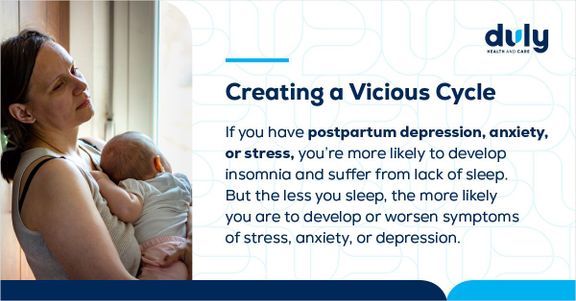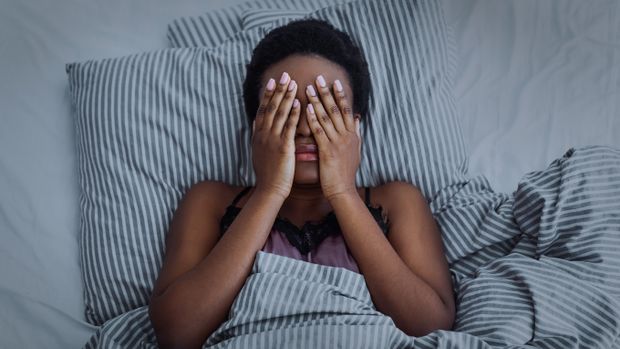You’ve been waiting for this moment: Your baby is sleeping through the night. You are looking forward to having hours of uninterrupted sleep time ahead of you.
You climb into bed, expecting to fall asleep as soon as your head hits the pillow.
Cut to 2 hours later, and you’re still awake — despite the fact that you’re also exhausted.
If this is your reality, you may have postpartum insomnia. Insomnia is a sleep disorder that involves having difficulty falling or staying asleep or getting good quality sleep. It’s a common disorder — especially among women who have recently given birth.
So, how is it that you are beyond exhausted but cannot get a good night’s sleep? Here are 6 reasons why your baby is sleeping through the night but you may not be.
1. You’re worried about your baby.
Motherhood is a 24⁄7 job — and worry comes along with the job. One of the biggest things that keeps moms up at night is fear that their baby will stop breathing while asleep.
This fear probably won’t go away in the near future. The good news is that there are steps you can take to keep your child safe when they’re sleeping — steps which might help you rest a little easier.
2. You can’t turn your brain off.
Falling asleep is difficult when your mind is racing — and that’s not uncommon when you’re a new mom. Whether you’re thinking about your baby’s schedule for the week, when you need to size up diapers, or when they’ll ever stop teething (don’t worry, it will happen), there’s a whole lot to think about.
You may also simply feel guilty about sleeping. While this might not be healthy, it’s normal for new moms. As you lay in bed, your mind might wander to all the things you didn’t get done during the day that you could be doing instead. Cleaning, doing laundry, fixing that broken cabinet door — before you know it, your guilt about taking time for yourself to go to sleep is giving you insomnia.
Getting rid of guilt might be easier said than done. But if you’re feeling guilty about doing something for yourself, remember that you’re actually also doing something for others. You’re at your best as a caregiver for someone else when you also care for yourself.
3. You’re struggling with your mental health.
Stress, anxiety, and postpartum depression (depression after giving birth that is more intense and long-lasting than the “baby blues”) are common among new moms. In fact, it’s estimated that anywhere between one in seven to one in ten women in the US have postpartum depression.
Unfortunately, these conditions can wreak havoc on your sleep — and they are known risk factors for insomnia.

If you have postpartum depression, anxiety, or stress, you’re more likely to develop insomnia and suffer from lack of sleep. But the less you sleep, the more likely you are to develop or worsen symptoms of stress, anxiety, or depression.
Practicing mindfulness techniques before bed, like meditation or deep breathing, are great ways to get yourself more relaxed. However, those techniques aren’t always enough.
If you are suffering from postpartum depression, anxiety, or stress — even if it’s not interfering with your sleep — don’t hesitate to talk to your provider.
4. You loaded up on caffeine.
Caring for a baby is tiring. And some days, especially those after a sleepless night before, you need to load up on coffee to get through the day.
Caffeine might be your lifesaver in the morning, but it’s something you want to avoid before bed — and not just in the hour or two leading up to it. The effects of caffeine can last for up to 6 hours. So if bedtime is 10 p.m., make sure to take your last sip of coffee before 4 p.m.
Having trouble sleeping as a new mom? Your OB/GYN or Sleep Medicine provider at Duly Health and Care may be able to help.
5. Or you took a few too many naps.
Naps might also be how you get through your day. For some women, napping is a great way to make up for lost sleep. But for other women, napping during the day can lead to more insomnia at night.
Don’t panic — you can still nap. In fact, there are other benefits of napping, like improved memory and increased alertness. Just try to limit your naps to 30 minutes and don’t nap after 3 p.m.
6. You’re a woman.
This isn’t to say that men never stay up worrying about their baby, but chances are, they have an easier time falling asleep. That’s not very surprising — the unfair truth is that females are more likely to have insomnia than men regardless of whether or not they have just had a baby.
How to Get to Sleep
You might not be able to get rid of worry, guilt, or your daily coffee, but there are still methods for helping you fall and stay asleep:
Practicing mindfulness techniques before bed, like meditation or breathing exercises
Avoiding screens an hour before bedtime
Exercising during the day, like when your baby is napping, rather than after they go to bed
Limiting how much you drink before bed so you won’t need to get up to use the bathroom
Over-the-counter sleep medications or supplements may also help, but check with your provider before anything, especially if you are breastfeeding.
Also read: Trending Sleep Aids: A few of our favorite products to help you catch great z’s
And remember — if you’re struggling with postpartum insomnia, you can always reach out to your OB/GYN or a sleep medicine provider.
Health Topics:








